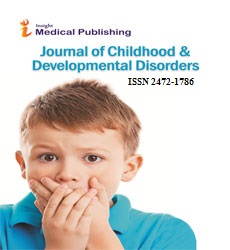We should not neglect the way child learns things: Learning Disabilities
Toshiaki Aizawa
Toshiaki Aizawa*
Department of Clinical Psychology, Waseda University, Shinjuku-ku, Japan
- *Corresponding Author:
Received: October 01, 2021; Accepted: October 18, 2021; Published: October 22, 2021
Citation: Aizawa Y (2021) Characteristics of Dyslexia and its effect on the Childhood. J Child Develop Dis Vol.7 No.9: e006.
Learning disorders are caused by genetic and/or neurobiological factors that disrupt one or more cognitive processes associated to learning through altering brain functioning. Basic skills like reading, writing, and math may be difficult to grasp due to these processing difficulties. Learning difficulties can have an impact on an individual's life outside of the classroom, affecting connections with family, friends, and co-workers.
People with learning disabilities, on average, have normal or above average intelligence. There appears to be a disconnect between an individual's potential and their actual accomplishments. This is why learning difficulties are known as "hidden disabilities": the person appears to be fully "normal" and intellectual, but may be unable to display the skill level anticipated of someone of a comparable age.
The signs and symptoms of learning disabilities are most often diagnosed during the school years since issues with reading, writing, and/or math are recognisable problems during that period. Some people, however, do not undergo an evaluation until they are in post-secondary education or are working adults. Others with learning disabilities may never have an evaluation and go through life without knowing why they struggle in school, at work, or in interactions with family and friends.
Learning Disabilities: What Are They and How Do They Affect You?
Has difficulty recognising nonverbal signs such as facial expressions or body language, and may be uncoordinated.
Non-verbal learning disorders are not yet recognised as a distinct form of learning disability in the IDEA or the DSM-5. According to a growing amount of research, roughly 5% of people with learning impairments experience the cognitive and scholastic challenges associated with nonverbal learning disabilities.
Nonverbal learning difficulties have been linked to impairment in three areas: motor skills, visual-spatial organisational memory, and social abilities, according to research.
It has an impact on a person's ability to comprehend what they read or hear.
People with Spoken/Written Language Disorder and Specific Reading Comprehension Deficit have trouble comprehending and expressing language in both oral and written formats.
Specific Language Impairment (SLI) is common in these people, and it's usually caused by problems with semantic and syntactic processing.
The term "semantic processing" refers to the process of encoding the meaning of words. Syntactic processing is concerned with the knowledge of word order and how it affects meaning. The statements "The blanket is on the baby" and "The blanket is on the baby," for example, have the same words but various meanings.
Planning, arranging, strategizing, attention to detail, and time and space management are all affected. Planning, organisation, strategizing, paying attention to and remembering details, and managing time and space are all affected by inefficiencies in the brain's cognitive management systems. Different patterns of deficit in executive functioning are virtually always found in the learning profiles of persons who have specific learning disabilities or ADHD, despite the fact that it is not a learning disability.
The field of learning difficulties has ever been. We may be able to grasp not just the regular process of reading, but also what occurs when the system fails, due to the improvement of technology that allow scholars to study the brain in action.
Open Access Journals
- Aquaculture & Veterinary Science
- Chemistry & Chemical Sciences
- Clinical Sciences
- Engineering
- General Science
- Genetics & Molecular Biology
- Health Care & Nursing
- Immunology & Microbiology
- Materials Science
- Mathematics & Physics
- Medical Sciences
- Neurology & Psychiatry
- Oncology & Cancer Science
- Pharmaceutical Sciences
